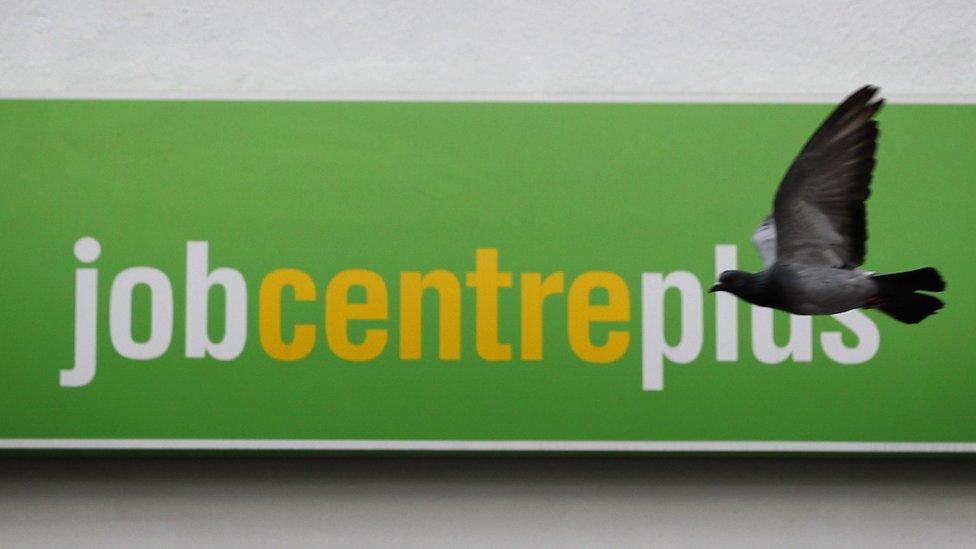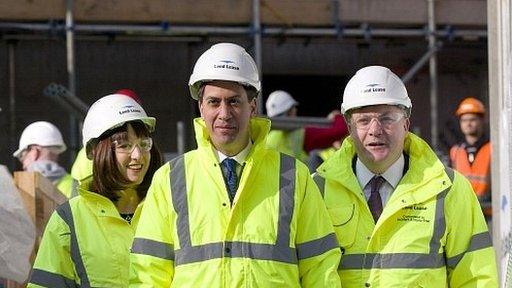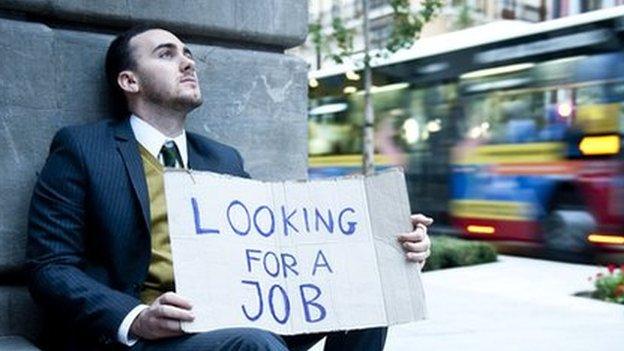Ed Miliband: Young jobless must train or lose benefits
- Published
Ed Miliband: "Young people should sign up for training, not sign on for benefits"
Young unemployed people who refuse to take training courses to gain key skills could lose benefits under a Labour government, Ed Miliband says.
Under the plan 18-21 year olds will only get Jobseeker's Allowance if they already have the skills to get a job.
Other changes will see higher rates of Jobseekers' Allowance for people who have been in work for five years.
The pledge comes as Mr Miliband insisted he could "defy the odds" by winning the next general election.
He was hitting back after a YouGov poll suggested as many as 60% of voters think he is not up to the job of being prime minister.
Mr Miliband acknowledged he had a "tough fight" to return Labour to power after one term in opposition, but said he was "relishing" the battle over the next 10 months leading up to the May 2015 poll.
On Wednesday's Newsnight ex-business secretary Lord Mandelson - who backed Ed's brother David to be party leader in 2010 - raised questions about the Labour leader's ability to win the election.
Asked whether he thought Mr Miliband was the best leader the party could have, Lord Mandelson said: "He is the leader we have and the leader I support and someone who I believe is capable of leading the party to victory."
He also criticised the Labour leader for not being "strong enough" in opposition and said he had "a year to get it right".
'Decent jobs'
Asked if he thought Lord Mandelson should "put a sock in it", Mr Miliband said he welcomed advice from anywhere, but said they could not be "continuity Labour" seeking to govern the UK next year in the same way as they had before the 2010 election.
Labour has consistently led the Conservatives in the polls over recent years but the public's perceptions of its leader are more negative than those of David Cameron, prompting concerns among supporters that Ed Miliband may drag his party's vote down in next year's general election.
Mr Miliband hit back at his critics saying it was "tough" for any party that had lost an election to get back into power after a single term in opposition.
.jpg)
The Labour leader says the current system discourages young people from getting the skills they need
But Labour was in a position to do just that in 10 months time - and would then deliver the "big changes" he believes the country needs.
Pledging to fight inequality and give a voice to the disenfranchised, he said: "I didn't take this job because I thought it would be a walk in the park.
"I took this job - and I fought for this job - because I had something distinctive to say about how we change this country and I believe that more now than I did three and a half years ago.
"And I relish the next 10 months... I relish the opportunity to fight for a country because this goes well beyond my party."
The Labour leader's speech to the Institute for Public Policy Research (IPPR) think tank announcing a series of measures aimed at making work pay is being seen as hitting back at critics who believe the party is too soft on welfare.
The think tank has set out some of the ideas behind the policy in a new report entitled The Condition of Britain: Strategies for Social Renewal, external.
Lord Mandelson: "He is the leader we have and therefore the leader I support"
If he becomes prime minister next year, Mr Miliband says he will end entitlement to adult out-of-work benefits for 18-to-21 year olds with no qualifications.
Instead they will get a "youth allowance" if they agree to undertake vocational training of AS level or equivalent. At the moment, they are prevented by benefit rules from training while looking for work.
'Big changes'
The new allowance is expected to be paid at the same £57 level currently given to under-25s on Jobseeker's Allowance.
But it will be means-tested so those with a family income of more than £42,000 a year will not be entitled to the new allowance. The policy is expected to affect about 100,000 young people.
edmil
As well as those who already have the necessary qualifications, there will also be exceptions for those with very young children or disabilities which prevent them preparing for work.
In his speech Mr Miliband also proposed an increase in Jobseeker's Allowance from £72 to £100 a week for those who had been in work for the previous five years.
The Labour leader wants to restore the contributory principle on which the post-war welfare state was founded.
"How many times have I heard people say: 'for years and years, I paid in and then when the time came and I needed help I got nothing out?'," Mr Miliband said in his speech.
"Rewarding contribution was a key principle of the Beveridge Report. And it is a key intuition of the British people.
"But it is a principle that has been forgotten by governments of both parties."
He claimed the proposed changes will come at no extra cost to the taxpayer - the title of the speech was "big changes, not big spending".
"We can't succeed as a country with unskilled young people going from benefits to low paid work and back again without proper skills.
"Because it doesn't give business the productive workforce they need. And it costs the taxpayer billions of pounds in extra welfare spending and lower productivity. So we're going to change it."
Mr Miliband has already announced his party's "jobs guarantee" scheme, under which 18 to 24-year-olds out of work for a year will be offered a taxpayer-funded job for six months - with those who refuse losing benefits.
'Depressing'
The Conservatives claimed Labour's plans were "just a recipe for more spending on welfare, more borrowing - and more taxes to pay for it".
Work and Pensions Secretary Iain Duncan Smith accused Labour of unfairly targeting families on below-average earnings, who he said would lose their children's right to "any kind of support".
Mr Duncan Smith says Labour's proposal is a "massive unfunded commitment" because most young people not in training, education or work do not have qualifications equal to AS- or A-level, or their vocational equivalent.
He claimed the problem of unemployment among young people was being solved by the current government through apprenticeships, training and work experience.

Britain's biggest trade union - and Labour's biggest financial backer - Unite welcomed Mr Miliband's commitment to training and education but accused the Labour leader of using "Tory rhetoric of sanction and punishment".
Assistant General Secretary Steve Turner said: "Our young people did not cause the economic crash and shouldn't be made to pay for it. Any idea that they want a life on benefits is risible when all they want is a decent job and a future."
At the 2013 Conservative Party conference, PM David Cameron suggested benefits paid to people under the age of 25 could be cut in an effort to reduce long-term worklessness.
- Published19 June 2014
- Published17 April 2014

- Published10 March 2014

- Published31 October 2013
